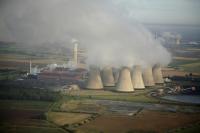Ever wonder why so many former climate change “skeptics” are now saying that global warming is real and we should think about doing something?
For many it’s a delay tactic. Lacking the scientific evidence to continue to deny what is so obviously a reality, some people are moving on to new PR tactics.
One such tactic has been uncovered by Dave Roberts at Grist. In an email back-and-forth from a “Skeptical Climate Science” discussion group, Richard S. Courtney, a coal industry defender, writes:
“Firstly, the value of carbon sequestration is political: n.b. it is not technological or economic.
There is opposition to power generation systems that emit CO2 as waste (this is similar to opposition to nuclear power systems that emit radioactive waste). A response to the opposition is needed until the AGW scare is ended. And claims of carbon sequestration (cs) provide that needed response although everybody knows cs would be too expensive for it to be used.” [Dave’s my emphasis]
This is the new age of global warming denial spin and its more desperate than ever. Now in a corner, having no science to stand on, people like Courtney are suggesting that it is now time to pay lip service to the public (who are genuinely concerned) and offer solutions that really aren’t solutions.
Subscribe to our newsletter
Stay up to date with DeSmog news and alerts







